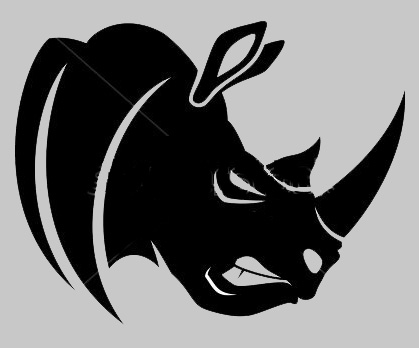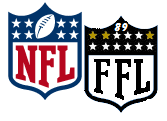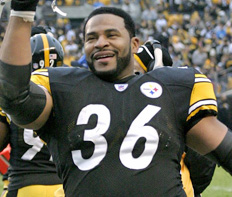History
of
Fantasy Football

Fantasy Football
|
Fantasy football is a game in which the participants serve as the general managers of virtual professional gridiron football teams. The competitors choose their team rosters by participating in a draft in which all players of a real football league are available. Points are based on the actual performances of the players in the real-world competition. The game typically involves the National Football League, Canadian Football League, American Alliance of Football or college football.
There are two main types of fantasy football:
Traditional in which the competition can run either for an entire season or many seasons if it is a keeper league,
Daily, an accelerated version in which the contests are conducted over shorter periods, such as a week or a single day.
Daily fantasy football is managed by commercial internet companies who charge a percentage of each betting pool. In the US, the two largest of these firms are FanDuel and DraftKings.
|
History
|
Modern fantasy football can be traced back to the late Wilfred "Bill the Gill" Winkenbach, an Oakland area businessman and a limited partner in the Oakland Raiders. In a New York hotel room during a 1962 Raiders eastern cross-country trip, Winkenbach, along with Raiders Public Relations man Bill Tunnel and Tribune reporter Scotty Stirling, developed a system of organization and a rulebook, which would eventually be the basis of modern fantasy football.
The inaugural league was called the GOPPPL (Greater Oakland Professional Pigskin Prognosticators League), and the first draft took place in the rumpus room of Winkenbach's home in Oakland, California in August 1963. The league consisted of eight members, made up of administrative affiliates of the AFL, pro football journalists, or someone who had purchased or sold 10 season tickets for the Raidersí 1963 season. Each roster consisted of the following in the GOPPPL: two quarterbacks, four halfbacks, two fullbacks, four offensive ends, two kick/punt returners, two field goal kickers, two defensive backs/linebackers and two defensive linemen. The current GOPPPL roster now includes two quarterbacks, four halfbacks, six wide receivers/tight ends, two kickers, two defensive backs, one return team, and a bonus pick for any position. As of 2012, the GOPPPL celebrated its 50th season and it still maintains its TD-only scoring heritage.
In 1969, Andy Mousalimas, an original creator of GOPPPL and participant in the inaugural draft, brought the game to his sports bar, the King's X in Oakland, California where he added another couple of leagues. When the patrons of other Oakland and San Francisco bars visited for trivia contests they soon learned of fantasy football and passed the word about it. Due to the time-consuming nature of the game's scoring it was difficult to pick up and spread slowly across the country.
For years, the popularity of fantasy football grew slowly. In 1976, several high school students held their first draft and in 2017 their league, Coach the Pros, will have their 42nd draft, making them the longest continuously operating fantasy football league in the world.
In 1985, The Grandstand Sports Services launched the first nationally available fantasy football leagues online through Q-Link (later America Online). Between 1985 and 1996 The Grandstand continued to improve on the game and the technology by being the first to offer automated drafting, real-time scoring, real-time trading and transactions and continuous leagues.
In 1989, Franchise Football League began it's first season with a purchased program from a computer store in Melrose Park Illinois. The first draft was held on a back porch in Elmhurst Illinois on a warm evening.
FFL89 started with 12 teams and a total point league. The 1990 season began with head to head competition The league still runs today with the same format. After the season ended the first Super Bowl setup was established with the top four teams playing for the Super Bowl champion. The following year all twelve teams were included in the Super Bowl. The Super Bowl format has changed over the years but still alll teams are included.
The first national fantasy football competition, Pigskin Playoff, was developed in 1989 by Lee Marc, Robert Barbiere and Brad Wendkos of Phoneworks who teamed with a West Coast Ad Agency (Wakeman & deForest) to launch the game in 1990 in a number of newspapers throughout the country including the Detroit Free Press, Los Angeles Times, Arizona Republic, Press Democrat. Archives of Pigskin Playoff are available online and in most public libraries. Pigskin Playoff is what current Daily Fantasy Sports are modeled after in that it was the first game to allow significantly large numbers of participants to compete against one another for prizes and more importantly converted football statistics into a simple scoring system. Participants created a team of NFL players, earned stats for those players based on actual performance, traded those players on a daily basis, and accrued points in an effort to compete against one another to win prizes. The group filed and was awarded US Patents 5,018,736A and 5,263,723A, for Interactive Game System and Method; Interactive Contest System.
In 1997, CBS launched the beta version of the first publicly available free fantasy football website. The game immediately became widely popular. Within three years, all major sports media websites launched competing for fantasy football hosting websites. The NFL released their own official game in 2010, NFL.com Fantasy Football, further driving industry growth. Fantasy football is now the single most important marketing tool for the NFL. Today, it is estimated over 19 million people compete in public and private leagues online nationally.
In 2009, a fantasy football-based sitcom, The League, was created by the husband-and-wife team of Jeff Schaffer (Curb Your Enthusiasm, Seinfeld) and Jackie Marcus Schaffer (Disturbia, EuroTrip), who serve as executive producers and directors. The series was produced by FX Productions.
|
League Types
|
In head-to-head leagues, a fantasy team matches up against a different fantasy team from the league each week. The team that receives the most points of the two receives a win for that week. Points are dictated by the scoring system that is either standard set by the website or custom set by the league. A team's total is the sum of all players' points who were placed in a starting slot by the team owner for the day they were playing (as opposed to being on the bench, in which any points gained would not count). Teams with the best win-loss record advance to the playoffs. If two teams have the same record, tiebreakers are employed based on league preference.
Total points leagues are leagues in which teams accumulate points on an ongoing basis. The league standings are determined by the teamsí total points.
All play leagues are leagues in which all teams play each other each week. For example, if there are 14 teams in the league, the top scoring team that week would post a 13-0 record, 2nd highest scoring team would post a 12-1 record and so on.
A Keeper style league allows teams to keep a set number of players from one year to the next and sometimes assign them contracts. In the first season of a keeper league, the draft is performed the same as any other standard league draft would be performed. In a keeper league you cut your roster limit to a certain number each offseason. Keeper leagues can keep as few as 1 or as many as even 16 or more in deeper keeper leagues. If your roster limit is cut down in the offseason, it's a keeper league as opposed to a dynasty league where you maintain your entire roster.[15]
A Salary cap league is a particular type of fantasy league which adds another factor of realism similar to the NFL: the salary cap. Each player has an associated salary and the total spent on all the players on a team has a maximum - the "salary cap."
In Auction leagues, a team is composed of players who are bought auction-style during the draft, as opposed to using traditional snake drafts that are common in fantasy football.
In Dynasty leagues, a team keeps all players from year to year and replenishes rosters through rookie drafts. Dynasty leagues are enhanced versions of keeper leagues. In dynasty leagues, your roster limit is unchanged in the offseason, or increases temporarily to allow the addition of rookies.
In Two-quarterback leagues, a team has the ability to start two quarterbacks in their weekly lineup. This changes the value of the quarterback position, as it doubles the number of quarterbacks able to start in any given week. However, in any fantasy football format, the number of quarterbacks who can start is determined by the league commissioner.
In Empire leagues, teams compete in a dynasty-format and prizes are offered for league winners. A special side-pot is created from entry fees each year. Once an owner wins the league two years in a row, the Empire pot goes to that owner, and the league starts over.
SuperFlex Leagues are leagues in which teams can start a QB in the flex position. Generally, a superflex position is added in addition to traditional roster spots such as a flex position. Often, defenses and kickers are removed from these league formats.
IDP or Individual Defensive Player leagues are leagues where teams draft individual defensive players in addition to offensive players, as opposed to drafting an NFL team's defense.[16]
Pirate Leagues are leagues where a winning team gets to choose a player from his opponent's roster.
Daily fantasy sports is like traditional fantasy sports where players draft a team of real-world athletes who then score fantasy points according to set scoring rules. However, instead of being stuck with the same team through a whole season, daily fantasy sports contests last just one day (or in the case of NFL, one weekend). Users can play head-to-head or in larger field tournaments. Both cash leagues and free contests are available for play.
|
Effect on American economy
|
The economic impacts of fantasy football are vast in number and value. Most of the impacts are positive on the economy overall, but there are some relatively minor drawbacks. Growth rates in fantasy football showed no signs of slowing down over the past few years. While team managers are drawn to fantasy football because they can get started and play for free, they are still likely to spend on many of fantasy football's complementary industries.
|
Wasted productivity
|
Despite all of the beneficial impacts on the economy that fantasy football provides, there are some concerns about potential economic drawbacks. The addictive nature and widespread popularity of fantasy football, combined with the relative ease of obtaining information about a managerís team have led to many hours of lost productivity at work. A rough calculation based estimates regarding the average amount of time team managers spend on their teams, combined with the number of team managers and their average wages puts the estimated impact at about $6 billion in wasted productivity. However, the study admits to being non-scientific and that its estimates are rough. Additionally, managers are often concerned with performance and disappointed when their team does not do well. Smack talk happens between team managers which may inhibit live interaction between co-workers. One example is the institution of the Rodriguez Line, where a team which frequently scores less than optimal points is openly mocked as having a sub-par team. Furthermore, it reports that managers tend to view the impact as a minor distraction. In a poll conducted for the same study asking managers to rate the impact of fantasy football on their workplace from 1-10, about 70% reported a 4 or lower. Less than 8% reported a 7 or 8. No respondents reported a 9 or 10. Additionally, employers can even take advantage of fantasy football by embracing it and starting sanctioned work leagues. This may increase employee morale and loyalty, improving retention rates. This study also reported 40% of respondents considered fantasy football a positive influence in the workplace, with 1 in 5 also saying they have developed valuable business contacts through fantasy football
|


Franchise Football League
est 1989
